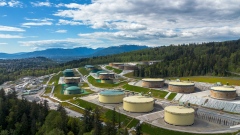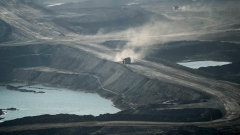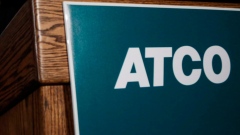Nov 15, 2023
Trudeau arrives in Golden State for APEC summit in San Francisco
, The Canadian Press
Russia's $26B grain supply deal with China may threaten Canada's exports
Prime Minister Justin Trudeau touched down Wednesday in northern California to begin three days of meetings with fellow leaders at the Asia-Pacific Economic Cooperation in San Francisco.
The government's newly acquired Airbus CC-330 taxied to a stop at San Francisco International Airport, where Kirsten Hillman, Canada's ambassador to the U.S., led a coterie of emissaries who greeted the prime minister as he disembarked.
The iconic motorcycle cops of the California Highway Patrol accompanied the prime minister's motorcade, sirens blaring, to the edge of the security zone where the summit is being held.
Trudeau's first order of business was a bilateral meeting with California Gov. Gavin Newsom, a kindred Liberal spirit whose efforts to combat climate change have made him a prominent and valuable ally.
From there, Trudeau was to attend a roundtable discussion about food affordability, then appear at an APEC reception hosted by U.S. President Joe Biden later in the day before a welcome dinner with tech leaders.
U.S. President Joe Biden, meanwhile, was sitting down with Chinese President Xi Jinping in an effort to defuse a year of international tensions, a meeting widely seen as the focal point of the summit.
Reports suggest the two leaders were working on a deal to resume bilateral military communications and keeping artificial intelligence out of their respective nuclear defence systems.
Trudeau, meanwhile, will be aiming for tangible progress on policy priorities in the Indo-Pacific, during bilateral meetings with fellow APEC leaders.
Federal officials say at least two bilateral economic initiatives with key Indo-Pacific partners will be on Canada's "deliverables" list.
The absence of Indian Prime Minister Narendra Modi also makes it unlikely there will be much drama surrounding Trudeau's allegations of a link between agents of India's government and the June shooting death of a prominent Sikh leader in B.C.
"Modi is not there, so India is not there," said Andreas Schotter, an associate business professor at Western University.
"It's been reported as giving the prime minister a chance to avoid the discussion about the issue, but I don't think it's a good thing. I think a meeting would have been better than avoiding it."
There's still plenty of important work for Canada to do at APEC, officials say: It's vital to be at the table in a part of the world where the decisions that are made are likely to affect Canadians for generations.
The main goals for Trudeau include deeper collaboration with APEC nations that will foster middle-class growth and healthy regional competition, all with an eye toward advancing the fight against climate change.
Officials say Trudeau will promote new Canadian efforts to foster more efficient food production and healthier supply chains, as well as removing trade barriers with countries in the Pacific Rim.
The region accounts for about half of the world's merchandise trade, and is the destination for more than 88 per cent of Canadian exports. APEC's merchandise exports and imports alike now both exceed US$12 trillion annually.
Canada's share of that pie reached $1.3 trillion last year, an increase of 22 per cent, thanks to partners that include the U.S., China, Mexico, Japan, South Korea and Vietnam.
The summit comes one year after the Liberal government launched a new $2.3-billion Indo-Pacific strategy aimed at fortifying regional alliances as a hedge against China's expansive power.
This report by The Canadian Press was first published Nov. 15, 2023.





